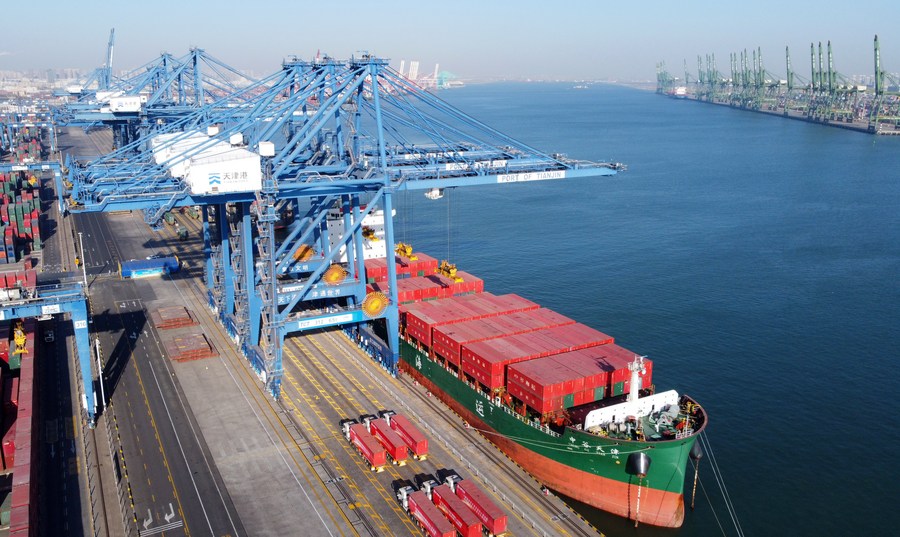Exporters gain from lower sea freight rates

Lower sea freight rates will benefit China's export-oriented companies in the fourth quarter, which can be a practical driver to stimulate demand in the global market, said analysts and exporters.
These comments came after spot rates for container shipments from Shanghai plunged 10.6 percent to $2,399 per forty-foot equivalent unit (FEU) on Sept 30, which have shown a downward trend for 20 weeks on the route to the west coast of North America, according to the latest data released by the Shanghai Shipping Exchange.
On the route to Europe, spot rates waned by 6.7 percent to $2,950 per twenty-foot equivalent unit (TEU), which have continued a downward trend for 18 straight weeks.
Affected by factors such as the disruption by the COVID-19 pandemic, insufficient shipping capacity and global markets' soaring demand, the cost of a standard container from China to the United States west coast was around $20,000 in September last year.
Due to the launch of new container vessels and shipping companies' move to deploy more container carriers between China and the US, it is not surprising to see cargo rates falling, said Dong Liwan, a professor of shipping management at Shanghai Maritime University.
The lower shipping rates can help domestic companies ease the burden on logistics expenditures and cut goods' costs in many parts of the world, as freight rates represent a fairly large part of total costs — even more than the value of goods at times, said Lin Meng, director of the modern supply chain research institute under the Chinese Academy of International Trade and Economic Cooperation in Beijing.
Caused by growing inflationary pressure, high energy prices and excessive goods supplies, Lin said, demand from overseas consumers has shrunk since the beginning of this year.
With the gradual recovery of consumer confidence, the shipping market demand is likely to grow in the fourth quarter, which will help further improve overall market supply and demand relationship, said Chen Shuai, vice-president of COSCO Shipping Holdings Co Ltd, a subsidiary of State-owned China COSCO Shipping Corp Ltd.
Global demand is at a relatively low point for the year and is expected to rise as overseas businesses have been gradually destocking, according to a preliminary survey of the market released by COSCO Shipping Holdings.
Ruan Hongwei, an official from Yiwu Customs, a branch of Hangzhou Customs, said these market changes have not notably affected businesses in Yiwu, the world's largest small commodity distribution center in East China's Zhejiang province.
The city's exports soared 25.1 percent on a yearly basis to 279.11 billion yuan ($38.81 billion) in the first eight months, Customs data showed.
Because the dropping sea cargo rates have helped foreign buyers to cut the transportation costs under trade transactions settled with free on board (FOB) contracts, which relieve the seller of responsibility once the goods are shipped, many exporters in Yiwu found that export orders have increased since August, Ruan said.
Noting the challenges ahead, Huang Huigu, chairman of Guangzhou Kingsons Leather Products Co Ltd, said it is necessary to further expand the export market in the coming months. The company has been increasing the space of the cross-border e-commerce market to create more added value for its global customers, which rivals in Southeast Asian nations such as Vietnam and Indonesia are unable to offer.
Apart from spending more cash on product designs, the Guangdong province-based exporter has already begun to assist its overseas clients in promoting sales via reinforcing intellectual property protection measures, producing commercial videos and providing cross-border logistics services.
Since the global shipping market has turned from a seller's market into a buyer's market, Morten Juul, head of ocean management for the Asia-Pacific region at A.P. Moller-Maersk, a Danish shipping and logistics service provider, said the changes to the macroeconomic environment are accelerating the pace of market normalization and enabling ports to decongest, which in turn will put pressure on the value proposition offered by carriers.

